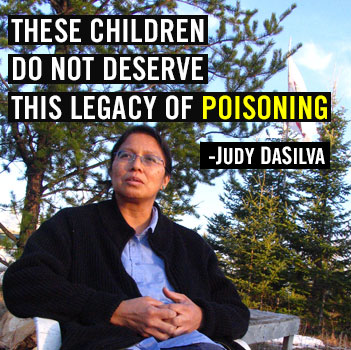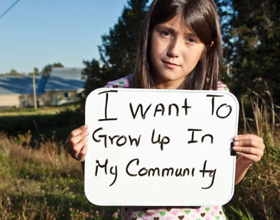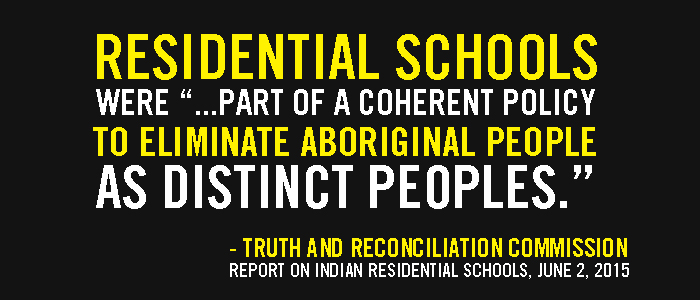
Dear Tracy,
A report released earlier this month by the Truth and Reconciliation Commission marked a watershed moment for the relations between Indigenous and non-Indigenous peoples in Canada.
For more than 100 years, Canadian government policy tore Indigenous children from their homes and families to be placed in residential schools.
The Truth and Reconciliation Commission sparked a long-overdue national conversation when it bluntly acknowledged that the residential schools were “part of a coherent policy to eliminate Aboriginal people as distinct peoples and to assimilate them into the Canadian mainstream against their will.”
But perhaps what’s most striking about the Commission’s report is how many of its 94 recommendations deal not only with the harms of the past, and their lasting legacy, but with current government programmes and policies that continue to deprive today’s generation of Indigenous youth a fair opportunity to have healthy, safe childhoods, to grow up in their own cultures and languages. and to realize their potentials.
The recommendations include, for example, a call to close the gap in funding for on-reserve First Nations education, measures to address the continued removal of Indigenous children by the child welfare system, and a national inquiry into the murder and disappearance of Indigenous women and girls.
Responding to the report, Amnesty International Secretary General Alex Neve pointed out that reconciliation and justice are inseparable and that justice has three fundamental elements: acknowledging the truth, setting things right, and ensuring that the harm is never repeated.
Ontario’s continued refusal to commit to cleaning up the waters at Grassy Narrows is simply inexcusable.
 A new report finds that mercury contamination in Grassy Narrows is up to 15 times higher than safety guidelines, yet the Ontario government still wants to allow clearcut logging to go ahead -- adding risk of even further mercury contamination.
A new report finds that mercury contamination in Grassy Narrows is up to 15 times higher than safety guidelines, yet the Ontario government still wants to allow clearcut logging to go ahead -- adding risk of even further mercury contamination.
Tell Ontario premier Kathleen Wynne to stop ignoring the long and troubling history of mercury contamination at Grassy Narrows and to respect the moratorium on unwanted forms of development called by the people of Grassy Narrows.
Missing and murdered Indigenous women and girls: Every Life Should Matter
 With the relesae of it's latest national survey of missing and murdered Indigenous women and girls, the RCMP announced that it’s no longer attempting to track murders of First Nations, Inuit and Métis women across all jurisdictions in Canada.
With the relesae of it's latest national survey of missing and murdered Indigenous women and girls, the RCMP announced that it’s no longer attempting to track murders of First Nations, Inuit and Métis women across all jurisdictions in Canada.
Unlike the 2014 survey, this year's report does not include records from over 300 provincial and local police agencies—including Ontario and Quebec.
The result of such incomplete reporting? The true extent of the violence faced by Indigenous women and girls remains unknown because of the RCMP’s incomplete dataset, and because of inconsistencies and inaccuracies in police recording of Indigenous identity.
Reconciliation Starts Here.

Many of the Truth and Reconciliation Commission’s recommendations deal with current government programmes and policies and include closing the gap in funding for on-reserve First Nations education, and measures to address the continued removal of Indigenous children by the child welfare system.
The Federal government's current underfunding of basic services in Indigenous communities relative to what is available in non-Indigenous communities, means that many of today’s generation of Indigenous youth are denied a fair opportunity to have healthy, safe childhoods, to grow up in their own cultures and languages, and to realize their full potential according to their own values and aspirations.
Amnesty International is proud to be part of the Child and Family Caring Society's Our Dreams Matter Too campaign to give First Nations children and youth a fair chance to grow up healthy and secure in their own communities.

No comments:
Post a Comment